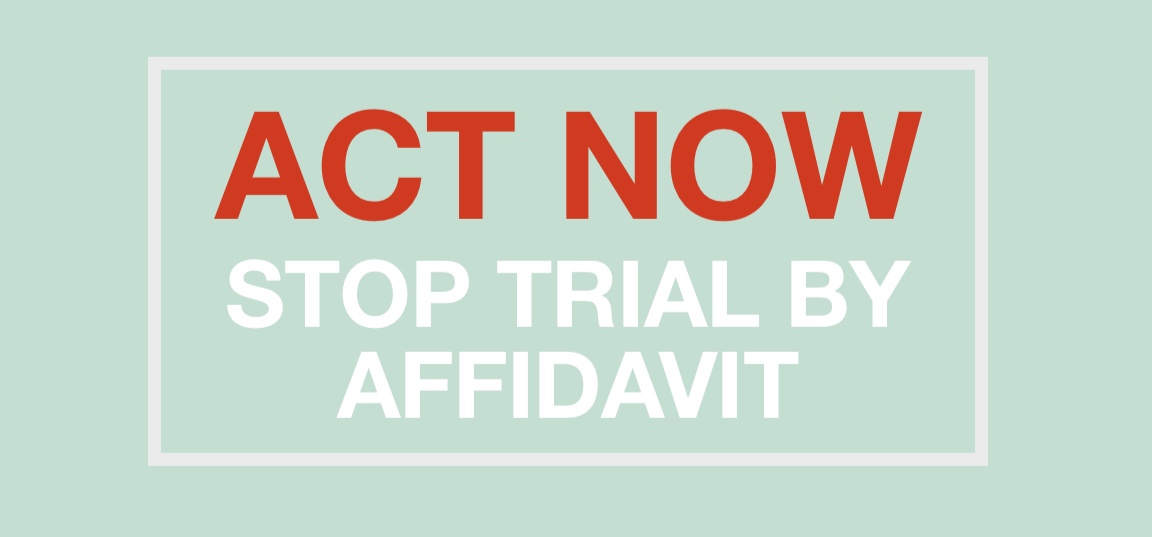URGENT: Stop Trial by Affidavit (SB 1076)!
We need your help—and it's URGENT!
On Monday, Jan. 14, 2019, the Courts of Justice Committee of the Virginia Senate will consider SB 1076, which would permit prosecutors to introduce prior statements of a witness for the truth of their contents if those witnesses testify differently at trial. In layman's terms, what that means is if a witness recants, a prosecutor can still use their earlier statement to convict the defendant. That prior statement might be a recorded interview with police, a signed affidavit, or transcript from a preliminary hearing -- whatever it is, that affidavit, interview or transcript takes the place of the accuser at trial, and the prosecutor may rely on it to convict the defendant.
Although proponents claim the bill is intended for instances when an abused partner recants, or a cooperating co-conspirator is intimidated, it is not limited to those circumstances. Here's a link to the bill text: http://lis.virginia.gov/cgi-bin/legp604.exe?191+ful+SB1076+pdf
What’s So Bad About SB1076?
For four hundred years, Virginia law has barred courts from considering accusations made by accusers who no longer stand by those accusations. The law has always required an accuser to swear, under oath, that their testimony is true for an accusation to hold up in court. This requirement is a cornerstone of our criminal justice system. Another cornerstone is the unfettered Sixth Amendment right to confront one's accuser at trial, before the factfinder that will determine one's guilt or innocence.
Even in their unadulterated form, those cornerstones of a fair trial are too often inadequate to prevent injustice. False testimony at trial is by far the most common source of false criminal convictions in the United States and the Commonwealth: a fact that exposes a deep structural flaw in the justice system, easily exploited by those acting on self-interest, and one for which due process has yet to find a reliable countermeasure. A comprehensive historical study of 350 erroneous convictions concluded that one-third of them were due to “perjury by prosecution witnesses” -- twice as many as the next leading source, erroneous eyewitness identification. H. Bedau & M. Radelet, Miscarriages of Justice in Potentially Capital Cases, 40 Stan. L. Rev. 21, 173 (1987).
The reason false testimony remains so pervasive in Virginia is because of our reticence to implement available, effective measures to prevent it, particularly in its most common manifestations (e.g. gang cases, drug cases, conspiracies, etc). In order to ascertain witness credibility, Virginia continues to rely almost exclusively on the traditional safeguard of cross-examination (confrontation) by the defense. Other safeguards like expanded discovery, depositions, cautionary jury instructions and reliability hearings, while becoming increasingly common elsewhere, are almost unheard of in the Commonwealth. A defendant in Virginia has only the oath and cross-examination to rely on. And if that doesn’t work -- which it usually doesn’t -- he pays with his liberty, or perhaps even his life.
This bill, even if well-intentioned, makes a mockery of due process, the oath to tell the whole truth, and a defendant's Sixth Amendment right to confrontation. If it results in even one false conviction, that is one too many. The bill has the potential to result in many more, however. Remember, incentives operate in both directions -- while it is true that intimidated, fearful witnesses may sometimes be discouraged from telling the truth, on the other hand there exists in our system an epidemic of self-interested witnesses whose hoped-for benefit encourages them to lie.
These are the co-defendants or co-conspirators, fellow gang members or drug dealers, jailhouse informants, or simply complainants who exaggerated in the moment who won’t come clean for fear of being charged with perjury or filing a false police report. Their incentive is to do whatever it takes to benefit themselves, even if it means lying. These are the witnesses who produce false convictions.
This bill will do as much to exacerbate the harm of self-interested witnesses as it will to limit the influence of witness intimidation and manipulation. Under this bill, lying witnesses need only tell their lie once -- to a police officer, a prosecutor or in a hearing with a relaxed burden of proof -- and they will be immune from the type of direct, demanding confrontation that is the bare minimum to ensure reliable conviction.
How Can You Help? Contact the Senate Courts of Justice Committee Members THIS WEEKEND
As bad as this bill is, unfortunately it's moving through the General Assembly rather quickly, with consideration in the Senate Courts of Justice Committee scheduled for Monday, January 14, 2019.
In order for your input to have an impact, you need to act now, before Monday, by calling or emailing the Senators on the Courts of Justice Committee. They hold the votes that matter right now, and we need you to tell them to VOTE NO ON SN 1076.
Those senators are as follows:
Mark Obenshain: district26@senate.virginia.gov
John S. Edwards: district21@senate.virginia.gov
A. Benton Chafin: district38@senate.virginia.gov
Richard "Dick" Saslaw: district35@senate.virginia.gov
Ryan McDougle: district04@senate.virginia.gov
Creigh Deeds: district25@senate.virginia.gov
Thomas Norment: district03@senate.virginia.gov
Richard Stuart: district28@senate.virginia.gov
Glen Sturtevant: district10@senate.virginia.gov
Janet Howell (bill sponsor): district32@senate.virginia.gov
William "Bill" Stanley: district20@senate.virginia.gov
Chap Petersen: district34@senate.virginia.gov
L. Louise Lucas: district18@senate.virginia.gov
Bryce Reeves: district17@senate.virginia.gov
Mark Peake: district22@senate.virginia.gov
Their phone numbers can be found here: https://apps.senate.virginia.gov/Senator/index.php
We appreciate your support and your passion for justice. We hope you can take several minutes out of your weekend to help defeat this poorly conceived bill.

